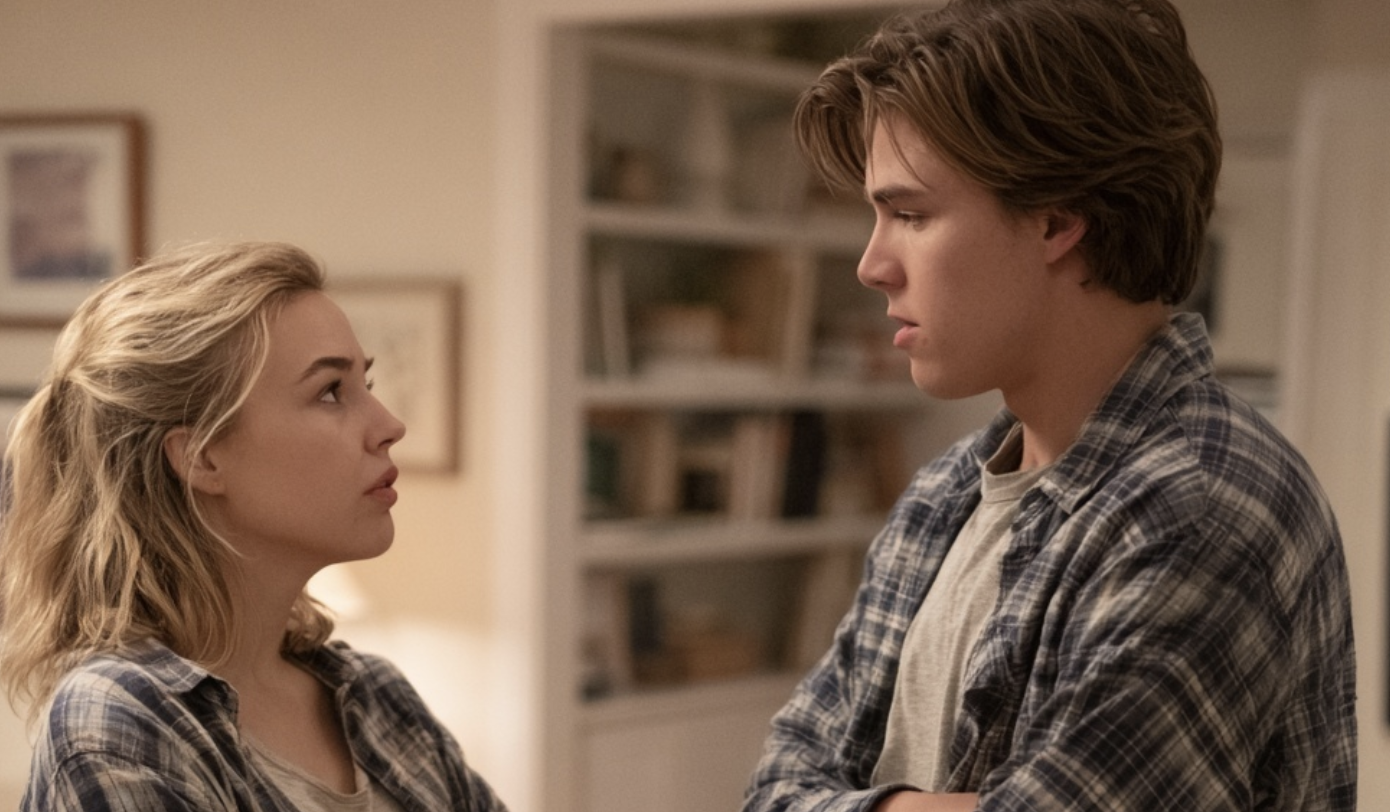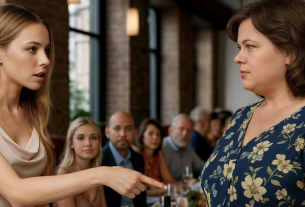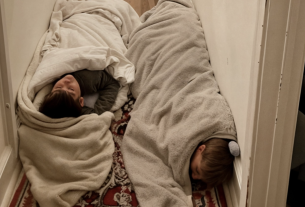— More junk again? You’d be better off spending it on food.
The phrase was tossed at her back, harmlessly, almost lazily, like you’d toss a bone to a dog. Igor didn’t even think it necessary to turn his head. His attention was completely absorbed by the flicker of colored blotches on the huge TV screen, where people in expensive suits were furiously shouting over one another. He was half-lying on the couch, taking up all of it with his massive, slack body—a sofa deity receiving offerings and pronouncing truths that required no reply.
Anna froze in the doorway to the living room. In each hand she held a neat paper shopping bag—not heavy, almost weightless. But at that moment they seemed to fill with lead. She felt the thin paper handles bite into her fingers. She didn’t answer. She didn’t turn around. She just stood there and stared at the back of his head, at the roll of fat over the collar of his old, faded T-shirt.
It was their tradition. Their small, ugly evening ritual. She came home from work, tired, wrung out, but with a little treat for herself—a new blouse, a hand cream, a book. It was her medicine for the grayness of the days, her way of reminding herself that she wasn’t just a function, not only “wife” and “employee,” but also a woman. And he, her husband, greeted this medicine with his dose of poison. Always the same: a contemptuous snort, a remark about useless spending, a hint at her frivolity.
She used to try arguing. She explained that it was her money, earned by her labor, that she had a right to spend it. Then she tried joking it off. Then—ignoring it. But poison, even in small doses, has a way of accumulating. And today, standing in this same spot, she suddenly understood with terrifying clarity that her system could no longer process it. The limit had been reached.
She walked past him in silence. Her steps on the laminate were quiet, but each one echoed dully in her head. She carried her bags to the bedroom the way one carries evidence from a crime scene. A crime in which she was both the victim and the accused. He didn’t follow her with his eyes. For him the episode was already over, the box checked, dominance confirmed. He could return to more important matters—like the fate of the country being decided inside the television.
Closing the bedroom door—not slamming it, but easing it shut until the latch clicked softly—Anna set the bags on the bed. She didn’t even look inside. The joy of the purchase, that warm anticipation with which she had chosen something new for herself, had been killed by a single phrase. Killed completely and irreversibly. Now those bags held not a dress, but material evidence of her humiliation. She sat on the edge of the bed and stared at a single spot on the wall for several minutes. There was no hurt in her head, no anger, no urge to cry. There reigned a cold, crystalline clarity. A thought that had been maturing in her for months had finally taken shape. The books must be honest. Well then, this evening she would conduct an audit. Full and merciless.
The bedroom became her operations center. Anna didn’t unpack the bags; they remained on the bed as a mute reproach, testimony to a crime that never was. She changed out of her office blouse and skirt into a plain home T-shirt and leggings. It wasn’t relaxation; it was preparation. Like a surgeon changing street clothes for a sterile gown before a complicated operation. Her movements were precise, economical, devoid of any fuss.
She sat at her small desk in the corner, pushed aside a stack of documents, and opened her laptop. The screen came to life, casting a cool bluish light onto her concentrated face. From the living room came the muffled drone of the TV—Igor continued his passive existence, unaware that a quiet but devastating revolution was beginning a few meters away.
Her fingers slid over the keyboard out of habit. Login, password. The online bank interface opened on the screen. Two cards. One—her personal payroll card, the one she used for her “frivolous” purchases. The second—the “joint” card linked to the account they had once agreed to fund in equal shares for “family needs.” Only for the last six months her share had been the only one regularly going in there, and the “family needs” had somehow narrowed to Igor’s personal needs.
She selected the second card. Set the filter for the last three months. An endless ribbon of transactions began to scroll downward. Anna didn’t peer at each one; she was looking for patterns. Her gaze, trained by years of working with reports and spreadsheets, picked key markers out of the flow of numbers and names. She didn’t frown, didn’t sigh. Her face remained impassive, as if she were analyzing not her own household budget but the financial report of some bankrupt company.
She opened a blank document and split it into two columns. Date, purpose, amount. And she began methodically, line by line, to copy them out. Her fingers tapped quickly and silently, entering dry facts into the table.
“Top-up of ‘Stavka’ account.” 1,500 rubles. Three days later another 2,000. A week later—1,000 more. They strung together into an ugly garland of gambling stretching across all three months.
“Bar ‘Hoppy Gnome.’” Check for 2,800. A week later “Bar ‘Beer Mile,’” 3,100. Endless Friday nights out with friends, after which he would come home and start, right from the doorway, telling her how exhausted he was from the week and how he absolutely needed to unwind.
“Payment Wargaming.” 500 rubles. 1,000 rubles. Another 500. Purchases of virtual tanks and their gold. Real money turned into pixels on the screen—the very same screen for which he was ready to strangle over every hundred she spent on a real, tangible face cream.
She worked for about an hour. Thoroughly, without emotion, like an impartial machine. She missed nothing: neither the small expenses for pizza delivery during lunch break nor the overpriced cigarettes from the night kiosk. Every kopeck with which he jabbed at her so fiercely was accounted for in his own spending. When the last transaction had been entered into the table, she hit “Sum.” The laptop thought for a moment and then produced a final figure. It wasn’t just large. It was insulting.
Anna looked at that number. And for the first time that evening, a barely noticeable, icy smirk touched her lips. She highlighted the table, formatted it, making the font large and bold so that each figure would scream from the page. Then she pressed “Print.” The room’s silence was broken by a soft whirring. The printer on the shelf came to life and began slowly, sheet by sheet, spitting out irrefutable evidence into the tray. Her bill for payment.
She left the bedroom with three sheets in her hand. Her stride was steady and calm, with not the slightest hint of the tremor that usually precedes a scene. She carried the printouts not like a war banner, but like an accountant bringing the annual report to the director for signature. Cold and businesslike.
Igor was still half-reclining on the couch. Next to him on the coffee table stood a sweating bottle of beer and a little bowl of salted peanuts. He clicked the remote lazily, hopping from channel to channel in search of something even more deafening than the political talk show. He sensed her approach but didn’t turn, making it clear that her presence was nothing more than background noise.
Anna didn’t say a word. She stepped up to the table and carefully laid the three sheets in an open spot, right between his beer bottle and the remote. White pages with black rows of numbers lay on the dark wood like a verdict.
He tore his gaze from the screen, skimmed the papers, then looked at her. Lazy irritation showed in his eyes. He had been interrupted.
“What’s this?” he hissed, not bothering to hide his displeasure.
“This is your budget,” Anna answered evenly. Her calm was unnatural, frightening—like the stillness before a storm. “For the last three months. I spent an hour analyzing your spending from our joint card. The very one you love to call ‘the family card.’”
Igor snorted and picked up the top sheet. He expected to see some kind of woman’s nonsense, a handwritten list of complaints. Instead he saw a neat, soulless table, as if exported from a banking program. His eyes ran down the lines. He stopped chewing. The muscles in his face tightened. He saw familiar names, figures he had tried not to notice, to forget the moment after punching in the PIN.
“What kind of crap is this?” He tossed the sheet back onto the table. “So you’re a bookkeeper now? Sticking your nose into my life?”
“I’m sticking my nose into our budget,” she corrected him, and for the first time there were steel notes in her voice. “Here, look. Twelve thousand on betting. Eight thousand—on beer bars with your buddies, and that’s not counting the beer at home. Five thousand—on donations in your tanks. Altogether, just on these three items—twenty-five thousand rubles in three months. From joint funds. And my bags today, if you’re so curious, cost four thousand. From my personal money.”
She paused, giving him time to digest the arithmetic of humiliation. He was silent; his face went from annoyed to crimson. He was caught. Caught in pettiness, in hypocrisy, in outright lies.
“So here’s the thing, Igor,” Anna went on, each word falling into the room’s silence like a stone. “I’ve been thinking. You worry about every penny and preach honesty in expenses. I decided to help you. Starting today, we have separate budgets.”
He shot her a look in which rage was already flaring. He opened his mouth to unleash a stream of insults, but she didn’t let him get a word in.
“And for the rent on your half of the apartment, the food from the fridge, and the utilities, I’ll be invoicing you monthly. You want everything to be fair, right? The books should be honest, shouldn’t they?”
For a few seconds the silence in the room was so dense that the TV’s drone seemed distant and out of place. Igor slowly set the bottle on the table. His face, crimson with anger a moment ago, began to take on an unpleasant, blotchy hue. He looked at Anna as if seeing her for the first time. Not his usual, quiet wife, but a stranger, a dangerous person who had invaded his home and was speaking a language he didn’t understand.
His first impulse was laughter. A short, barking laugh devoid of any mirth.
“You… what, have you lost your mind? What bill? What rent? This is our home, Anya. Or did you forget?”
“I remember. But you seem to have forgotten that this home is ours. In equal shares. Yet somehow one of us feels entitled to live at the other’s expense while belittling them for every thousand spent on themselves.” Her voice didn’t waver, didn’t rise a single note. She spoke like a newscaster reading a bulletin. “I’m simply restoring fairness.”
That word—“fairness”—hit him like a detonator. His world, so simple and comprehensible, where he was the center and she a convenient function, was collapsing before his eyes. And he exploded.
“Fairness? You decided to play fairness, you miserable bean-counter? Do you even understand what you’re saying? I’m a man, I work! I have a right to relax! To go out with friends, have a beer! And what do you do? Sit in your little office shuffling papers, then bring home your junk! And you dare to throw anything in my face? You should be grateful I even put up with your quirks!”
He jumped up from the couch. Not threateningly, more theatrically, as if performing a scene for an invisible audience. He began to pace the room, waving his arms; his voice grew louder, swelling with what he took for righteous indignation. He went for the personal, grabbing at anything that might hurt her: her “boring” job, her “useless” friends, her habit of reading books instead of “taking care of the house.” It was a stream of filth designed to knock her off her feet, make her feel guilty and worthless, to shove her back into her accustomed place.
Anna stood and watched him. She didn’t interrupt. She let him run dry, pour it all out. Her composure enraged him even more. He saw that his words, his poison, weren’t hitting the mark. They bounced off her icy self-control like peas off a wall.
“Stop poking me over every penny, Igor! I don’t ask you for money for my expenses; I earn that myself! And quit counting money that isn’t yours!”
“Yours?” he shrieked. “What is it you earn—your pennies? Enough for rags? Who even needs you with your job and your ambitions?”
And then she delivered the final blow. Not loudly, not nastily. Almost matter-of-fact.
“Speaking of junk,” she said, with a faint, barely noticeable smile at her lips. “What I bought today isn’t just a dress. It’s a business suit.”
She paused, savoring his bewildered expression.
“For a new job. At a company where the starting salary is twice yours. And yes, Igor, I got the position. I start Monday.”
He froze with his mouth half open. The air leaked out of him with a soft hiss.
“So the rent invoice,” she went on with deadly method, “we’ll of course recalculate. Based on the new realities and my new contribution to this so-called ‘joint’ budget. The books must be honest.”
Igor slowly sank back onto the couch. He wasn’t looking at her but somewhere through her. All his anger, all his affected confidence had washed away, leaving a void. He was destroyed. Not by shouting, not by a scandal, but by simple, inexorable arithmetic. In an instant, from the master of the house who reproached his wife for buying “junk,” he had turned into a petty dependent, a pitiful loser who spent joint money on beer and virtual tanks while she was building a real career. The TV was loudly saying something about exchange rates. But Igor no longer heard it. He sat at the center of his apartment, on his couch, and for the first time in his life felt absolutely like a stranger…



